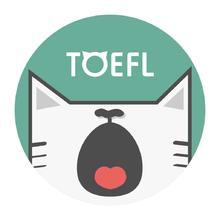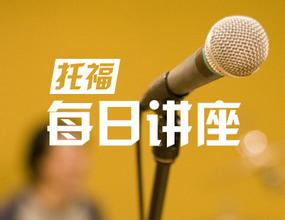 返回
教育头条
返回
教育头条

托福听力信号词究竟该如何使用
托福听力信号词究竟该如何使用?
托福听力,对很多同学来说,都是比较困难的。借用唐代诗人李白的一句话来说,那真是听力难,难于上青天呀。不过大家不必恐慌,苏州环球教育尹美芳老师这就来为大家释疑解惑,要知道耗资如此巨大的语言类测试背后必定有其考题套路的,而套路之一就不可避免地得提到信号词了。
关于信号词的介绍,市面上已经有了林林总总的版本。你需要明确的并不是信号词分类有哪些,相反,我们需要关注的其实是了解了何为信号词之后,更要知道信号词应该如何使用,如何借助信号词让我们高效迅速地解题。
那我们现在就以信号词中比较不常见的表示观点或结论性的信号词为例,TPO10Lecture4中原文如下:
Piaget proposed that young children don' t have a way to represent things that aren' t right in front of them. That's what language does, right? Words represent things, ideas.(此处说明幼小的孩子们不具备一定的语言能力表达那些不是即刻发生的事情,潜台词是说孩子们无法将他们见到的或者经历过的事情描述出来,也就是很小的孩子不具备回忆能力。)
Well, finally in the 1980s, a study was done. And this study showed that very young children under the age of 2 do have the capacity for recall. Now if the children can ' t talk, how was recall tested? Well, that is a good question, since the capacity for recall has always been linked with the ability to talk.(20世纪80年代的一项研究表明,两岁以下的孩子确实具备回忆能力。)
出现这类的信号词的时候,正确的处理方式是要把这个信号词写下来吗?不,如果这样做,你就错了。在这种情况下,我们真正的关注点应该放在人名以及该人物的观点或者实验以及实验结论上。

原文题目如下:
The professor mention a study in the 1980s that tested memory in children under age 3 . What did the researchers conclude from this study?
A.Young children do not develop the capacity for recall until after age 3
B.Piaget 's theory linking language development to memory was incorrect
C.Young children typically remember events for about nine months
D.The formation of memories is dependent upon language development
经过这样的信号词处理,我们将关键词迅速提炼出来,并且能够找到正确选项B。
然而呢,这只是信号词的冰山一角?。希望每一位爱学习爱思考的友友们都能在托福学习的道路上披荆斩棘,早日取得理想的成绩。
托福听力,对很多同学来说,都是比较困难的。借用唐代诗人李白的一句话来说,那真是听力难,难于上青天呀。不过大家不必恐慌,苏州环球教育尹美芳老师这就来为大家释疑解惑,要知道耗资如此巨大的语言类测试背后必定有其考题套路的,而套路之一就不可避免地得提到信号词了。
关于信号词的介绍,市面上已经有了林林总总的版本。你需要明确的并不是信号词分类有哪些,相反,我们需要关注的其实是了解了何为信号词之后,更要知道信号词应该如何使用,如何借助信号词让我们高效迅速地解题。
那我们现在就以信号词中比较不常见的表示观点或结论性的信号词为例,TPO10Lecture4中原文如下:
Piaget proposed that young children don' t have a way to represent things that aren' t right in front of them. That's what language does, right? Words represent things, ideas.(此处说明幼小的孩子们不具备一定的语言能力表达那些不是即刻发生的事情,潜台词是说孩子们无法将他们见到的或者经历过的事情描述出来,也就是很小的孩子不具备回忆能力。)
Well, finally in the 1980s, a study was done. And this study showed that very young children under the age of 2 do have the capacity for recall. Now if the children can ' t talk, how was recall tested? Well, that is a good question, since the capacity for recall has always been linked with the ability to talk.(20世纪80年代的一项研究表明,两岁以下的孩子确实具备回忆能力。)
出现这类的信号词的时候,正确的处理方式是要把这个信号词写下来吗?不,如果这样做,你就错了。在这种情况下,我们真正的关注点应该放在人名以及该人物的观点或者实验以及实验结论上。

原文题目如下:
The professor mention a study in the 1980s that tested memory in children under age 3 . What did the researchers conclude from this study?
A.Young children do not develop the capacity for recall until after age 3
B.Piaget 's theory linking language development to memory was incorrect
C.Young children typically remember events for about nine months
D.The formation of memories is dependent upon language development
经过这样的信号词处理,我们将关键词迅速提炼出来,并且能够找到正确选项B。
然而呢,这只是信号词的冰山一角?。希望每一位爱学习爱思考的友友们都能在托福学习的道路上披荆斩棘,早日取得理想的成绩。
如果大家通过上面的阅读,还想了解更多托福相关信息,可以关注我的微信18560125702,我会为你匹配最适的学习方案,选课有问题,快来找学姐,嘻嘻。返回教育宝头条
【免责声明】本文仅代表作者本人观点,与教育宝无关。教育宝对文中陈述、观点判断保持中立,不对所包含内容的准确性、可靠性或完整性提供任何保证。请读者仅作参考,特此声明!





